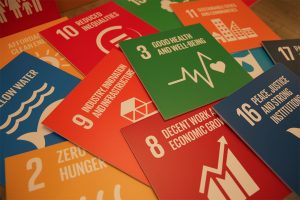13 June 2017: UN officials briefed Member States and other stakeholders on key messages that emerged from two recent Expert Group Meetings (EGMs), one on Sustainable Development Goal 1 (no poverty) and the other on SDG 2 (zero hunger). The EGMs are part of a series of thematic meetings on some of the SDGs to be reviewed in depth at the 2017 session of the UN High-level Political Forum on Sustainable Development (HLPF).
The briefing was organized by the UN Department of Economic and Social Affairs (DESA), in collaboration with the Food and Agriculture Organization of the UN (FAO), the International Fund for Agricultural Development (IFAD), the World Food Programme (WFP), the UN Development Programme (UNDP), and the World Bank Group. It took place on 13 June 2017, in New York, US.
Opening the meeting, Shantanu Mukherjee, Division for Sustainable Development (DSD), DESA, said the two have been crucial in identifying cross-cutting linkages among the SDGs. He said that many countries have incorporated the SDGs into their national plans, and the creation of SDG inter-ministerial coordination mechanisms and other initiatives by countries shows that there is “policy traction” for national-level implementation.
Presenting the outcomes of the SDG 1 EGM, the World Bank said the meeting highlighted the need to: 1) promote inclusive and sustainable growth, such as reducing inequalities, boosting human capital, improving connectivity to markets and promoting decent jobs; 2) invest in people, including in health, nutrition and education, and complement it with investments in infrastructure and universal access to basic services; and 3) promote resilience, for instance by providing social protection and safety nets, and ensuring complementarity between development and humanitarian efforts. On cross-cutting issues, the EGM stressed the importance of: 1) making evidence-based decisions, and strengthening efforts to close data gaps, use disaggregated and other types of data, and build capacity; 2) using multi-pronged financing strategies that are embedded in institutions, have strong ownership, leadership and vision, and are predictable and sustainable; and 3) building on stronger, more inclusive and diverse partnerships such as creative insurance mechanisms in agriculture that could leverage government, private sector and civil society resources. UNDP added that the EGM had highlighted the importance of making growth more inclusive and sustained over a long period of time, and ensuring that it cuts across various sectors.
On SDG 2, FAO, IFAD and WFP said the EGM’s discussions had called for: political commitment and country-specific responses driven by partnerships; sustainable food systems and transformative changes in food and agriculture to raise production and productivity while addressing economic, social and environmental impacts; and recognizing the importance of diversity in its different dimensions, including diversifying the places of production, and implementing agro-ecological and other innovative approaches. The EGM also stressed the need for: more inclusive governance structures; incorporating and building from indigenous knowledge in science, technology and innovation (STI); innovative ways to promote access to knowledge and engage with the private sector; and acting urgently to respond to the current severe food insecurity crises.
Reacting to the briefing, participants noted that the zero draft of the HLPF Ministerial Declaration, which is currently under discussion by UN Member States, could benefit from stronger language on SDG 2 and on securing equal tenure rights, among other issues. Some suggested developing food-based dietary guidelines that include sustainability criteria, and analyzing investments to identify their impact on nutrition.
David Nabarro, the UN Secretary-General’s Special Adviser on Sustainable Development and Climate Change, noted the excellent quality of the EGM discussions. He observed that, for governments, suggestions emerging from expert meetings can sound complex when it comes to agriculture, land use, climate change adaptation and food security, and encouraged experts to “put ourselves in the minds of those responsible for making policy choices,” to identify the types of investments and facilitation that would benefit them.
The SDG 1 EGM took place in Copenhagen, Denmark, from 11-12 May 2017, and was co-hosted by the World Bank Group, UNDP and DESA. The SDG 2 EGM took place in New York, US, from 12-13 June, and was organized by DESA in collaboration with FAO, IFAD and WFP. The written summaries of the EGMs are expected to be posted online on the HLPF 2017 website before it convenes from 10-19 July. [SDG Knowledge Hub Story on EGMs] [HLPF 2017 Website]


